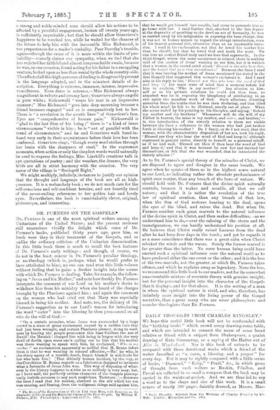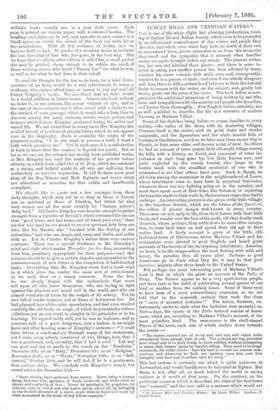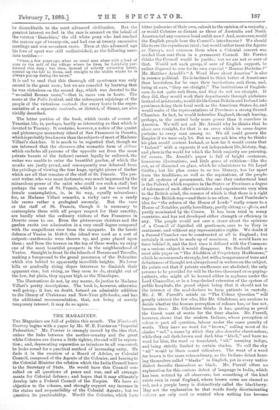DAILY THOUGItTS FROM CHARLES KINGSLEY.* WE hope this useful little
hook will not be confounded with the "birthday books" which crowd every drawing-room table, and which are intended to connect the name of sonic loved relative or friend with a snippet, from Shakespeare, a quaint drawing of Kate Greenaway, or a sayi-g of the Hatter out of Alice in Won(lcfludol. Nor is this book of extracts to be compared with those devotional works which a friend of the writer described as "a curse, a blessing, and a prayer" for every day. But it may be rightly compared with a little series of books, " Diamond," " Ruby," " Pearl," &c., in which gems of thought from such writers as Ruskin, ninelon, and Pascal are collected in so small a compass that the book may be carried in the waistcoat-pocket. And we are thus led to say a word as to the shape and size of this work. It is a small octavo of nearly 300 pages, daintily dressed, as Messrs. Mac
millan's books usually are, in a neat cloth cover. Each page is printed on creamy paper, with a coloured border. The headings and dates are in red, and opposite to each extract is a blank space, on which the owner of the book can write his or her annotations. With all this evidence of loving care we have no fault to find. It speaks of a reverent desire to enshrine the best thoughts of him who has gone, in the best way. But we hope that ai edition after edition is called for, a small pocket size may be printed, cheap enough to be within the reach of those working-classes who loved " Parson Lot" for what be was, as well as for what he had done in their behalf.
To read the thought for the day as he rests for a brief threequarters of an hour, would be a real refreshment to many a workman who cannot afford time or money to buy and read all Canon Kingsley's books. We also think that an index would be a useful addition to future issues. Almost any book without an index is, in our opinion, like a man without an eye ; and in the case of these extracts one is often struck with a desire to see the context of some passage, which it would take a long time to discover among the many sermons, novels, essays, poems, and lectures which Canon Kingsley produce d during his active and varied life. We are aware that in many cases Mrs. Kingsley has availed herself of portions of private letters which do not appear even in the biography. Such is probably the origin of the pregnant saying, " I do not want to possess a faith, I want a faith which possesses me." Yet in such cases it is a satisfaction at least to know that the context is beyond our reach. But so far as we can see, the extracts are mostly from published works, as Mrs. Kingsley has used the material of the private letters already, in a little book called Out of the Deep, which we commend as a strong and helpful guide to all who are suffering from melancholy or nervous depression. It will do them more good than all the Hop Bitters and Malt Extracts and tonics which are advertised as remedies for that subtle and insufferable complaint.
We should like to quote not a few passages from these daily thoughts, which may not be so deep as those of Faseal, nor so spiritual as those of Fenelon, but which for that very reason are all the more suitable for " human nature's daily food." If Charles Kingsley were humble enough to gather strength from a vignette of Bewick's which contained the maxim that " good times, and bad times, and all times pass over," there are few who need be too proud to receive spiritual help from one who, like his Master, was " touched with the feeling of our infirmities," and who can laugh, and weep, and doubt, and suffer with us. For in Charles Kingsley's nature there were curious contrasts. There was a special freshness in Mr. Kingsley's mind and style which makes Thoughts for the Day, proceeding from him, peculiarly appropriate for their purpose,—and this purpose should be to give a certain impulse and animation to the commencement of new duties or the completion of half-finished tasks. Everything that Mr. Kingsley wrote had a fresh wind in it which gives the reader the same sort of refreshment as an early blow on a breezy common. None the less, he was deeply tinged with the melancholy that must fall upon all who know themselves, who are trying to fight against the physical and moral evil in the world, and who are almost overborne at times by the weight of its misery. Yet he was full of tender humour, and at times of boisterous fun. He had plunged into philosophic speculation, and had even studied carefully the old books on magic, of which he possessed a curious collection, yet no one could be simpler in his principles or in his teaching. He argued fairly well, yet he was no logician ; and as someone said of a good clergyman, now a bishop, so he might have said after hearing some of Kingsley's sermons :—" I could have driven a coach-and-six through many of his statements, yet I came away utterly convinced of two things, first, that I was a gentleman, and, secondly, that I had a soul." Let any one read and try to profit by the words on the " Emotions," December 4th ; or on " Daly," December 5th ; or on " Religion," November 25th ; or on " Waste," November 18th ; or on " Self. control," October 28th, and he will feel, if he is a gentleman, that noblesse oblige. We conclude with Kingsley's simple but sound advice for December 13th :—
"Have charity, have patience, have mercy. Never bring a human being, however silly, ignorant, or weak, above all, any little child, to shame and confusion of face. 'Never by petulance, by suspicion, by ridicule, even by selfish and silly haste, never, above all, by indulging in the devilish pleasure of a sneer, crush what is finest and rouse up what is coarsest in the heart of any fellow-creature."
TUSCAN HILLS AND VENETIAN WATERS* Tuts is one of the many slight but pleasing productions, treating of Italian life and Italian beauty, which seem to be prompted by an affectionate remembrance of the scenes and people they describe, and whch, even when they have no merit of their own to recommend them, prove attractive to us from the memories they recall and the sympathy that is aroused when familiar scenes are again brought before our minds. The present writer, too, has seen and admired these places ; and there is some interest in seeing how another person has been affected by them, whether his views coincide with one's own, and, consequently, whether he is a person of taste ; and even if one utterly disagrees with him, there is still a certain bond between us from the natural desire to reason with the writer on the subject, and, gently but firmly, point out the error of his views. The book before us now, possesses the additional attraction of being written by one who loves and sympathises with the country and people she describes, and knows them thoroughly. Few English ladies, certainly, are as well qualified to describe the life and manners of modern Tuscany as Madame Villari.
Some of her sketches bring before us scenes familiar to every tourist,—the valley of the Arno, with its clustering villages, Florence itself in the centre, with its great dome and slender campanile, and the Apennines and the white marble bills of Carrara in the distance, much as we have seen them on our way to Fiesole, or from some other well-known point of view. In others we find an account of some quaint little old-world village among the hills, with a history, no doubt, and possessed of some importance in days long gone by, but little known now, and quite neglected by the sturdy tourist, who keeps to the beaten track with the steadfast resolution of one who is determined to see what others have seen. Such is Barga, an old town among the mountains in the neighbourhood of Lucca, whose inhabitants seem to have been in perpetual hot-water, whenever there was any fighting going on in the country, and must have spent most of their time, like Solomon, in repairing
the breaches made in their walls by the incessant sieges they had to undergo. An interesting picture is also given of the little villages in the Lucchese district, which are the homes of the figurinai, the sellers of plaster images well-known in every country.
These men set out, early in life, from their homes with their little stock, and wander over the face of the earth, till they finally reach America, where, perhaps, they settle down to some other occupation, to come back later on and spend their old age in their native land. A lively account is given of the little, oldfashioned town of Ghivizzano, where Madame Villari and her companions were greeted in good English, and heard great accounts of the travels of the far-roaming inhabitants. America, we learn, is to the image•sellers the land flowing with milk and honey, the paradise they all yearn after. Perhaps as good Americans go to Paris when they die, it may be that good jigurinai migrate after their death to the United States.
But perhaps the most interesting part of Madame Villari's book is that in which she gives an account of the Patio of Siena. The Sienesi appear to be a very sport-loving people, and have been iu the habit of celebrating annual games of one kind or another from the earliest times. Some of these seem to have been of a most extraordinary character, as we are told that in the sixteenth century they took the form of " races of mounted buffaloes !" The writer, however, unfortunately omits to state what the buffaloes were mounted on. Now-a-days, the sports at the Patio festival consist of horseraces, which are, according to Madame Villari's account, of the most primitive kind. The race-course is the shell-shaped Piazza of the town, each side of which shelves down towards the centre :—
" The horses entered are of every sort and age, and taken indiscriminately from plough, cart, or cab. The jockeys are big, powerful men, whose aim is to stick firmly to their saddles, without attempting to spare their horses' backs by careful riding. They need to be rough customers, for every fantino does his best to unseat his nearest competitors, and whenever ho finds one gaining upon him cuts him savagely over face and shoulders with his whip."
This last custom is certainly one which is quite unknown at Newmarket, and would hardly even be tolerated at Egham. But Siena is not, after all, so much behind the world in racing matters as it would at first seem. On the contrary, on the
particular occasion which is described, the rider of the best horse was "squared," and the race sold in a manner which would not be discreditable to the most advanced civilisation. Bat the greatest interest we feel in the race is aroused on the behalf of the veteran Bianchino,' the old white pony who had reached the mature• age of twenty-six, and had run at twenty successive meetings and won seventeen races. Even at this advanced age his love of sport was still undiminished, as the following anecdote testifies :—
" Once, a few years ago, when as usual sent alone with a load of corn to the mill of the village where he lives, be faithfully performed this duty; but then, instead of soberly returning home, trotted up the hill to Siena, and straight to the stable where he is always put-up daring the races."
It is sad to read that this thorough old sportsman was only second in the great race ; but we are consoled by learning that he was victorious on the second day, which was devoted to the " so-called Roman races,"—that is, races run in heats. The scene at the Patio festival, and the subsequent rejoicings of the people of the victorious contra& (for every horse is the representative of a separate contracia, or district, of Siena), are also vividly described.
The latter portion of the book, which treats of scenes of Venetian life, is, perhaps, hardly as interesting as that which is devoted to Tuscany. It contains, however, a notice of the quaint and picturesque monastery island of San Francesco in Deserto, which is probably less known than thesubjects of most of Madame Villari's sketches. It is much to be regretted that, though we are informed that the elausura (the monastic form of cloture which excludes all persons of the opposite sex from the more private haunts of the fathers) cannot legally be enforced, the writer was unable to enter the beautiful garden, of which the monks are justly proud, and consequently was debarred from the privilege of viewing the four huge, upright pieces of timber which are all that remains of the staff of St. Francis. The present writer, who was more fortunate, was much impressed by the miraculous power of the saint who could use such a staff; but perhaps the cave of St. Francis, which is not too sacred for female contemplation, is, in its way, equally miraculous ; for, as Madame Villari remarks, a rocky cave on a sandy isle seems rather a geological anomaly. But the cave or the staff of St. Francis, though it is necessary to contemplate them with all proper respect for their sanctity, are hardly what the ordinary visitors of San Francesco in Deserto come to see. Even the picturesque cloisters and the garden excite our admiration in a very small degree compared with the magnificent view from the ramparts. In the heroic defence of Venice in 1848.9, the island was used as a sort of outpost—earthworks were thrown up, and guns placed upon them ; and from the terrace on the top of these works, we enjoy one of the most beautiful prospects in the neighbourhood of Venice. Straight in front lie the islands of Burano and Torcello, making a foreground to the grand panorama of the Dolomites which rise behind to apparently incredible heights. No lower hills or gradually rising slopes intervene to diminish their apparent size; but rising, as they seem to do, straight out of the low, flat plain, they appear high as the Himalayas.
The illustrations do not, by any means, do justice to Madame Villari's pretty descriptions. The book is, however, otherwise well got-up ; it has, no doubt, formed an admirable addition to the library of Christmas and New-Year gift-books, and has the additional recommendation, that, not being of merely temporary interest, it may do so again.




































 Previous page
Previous page